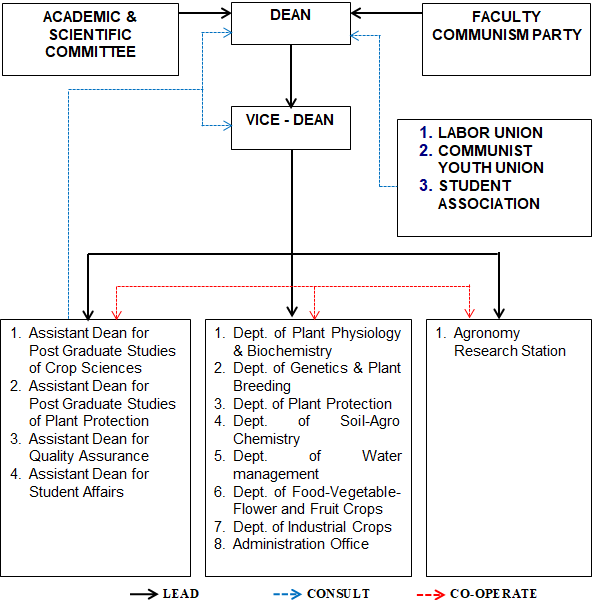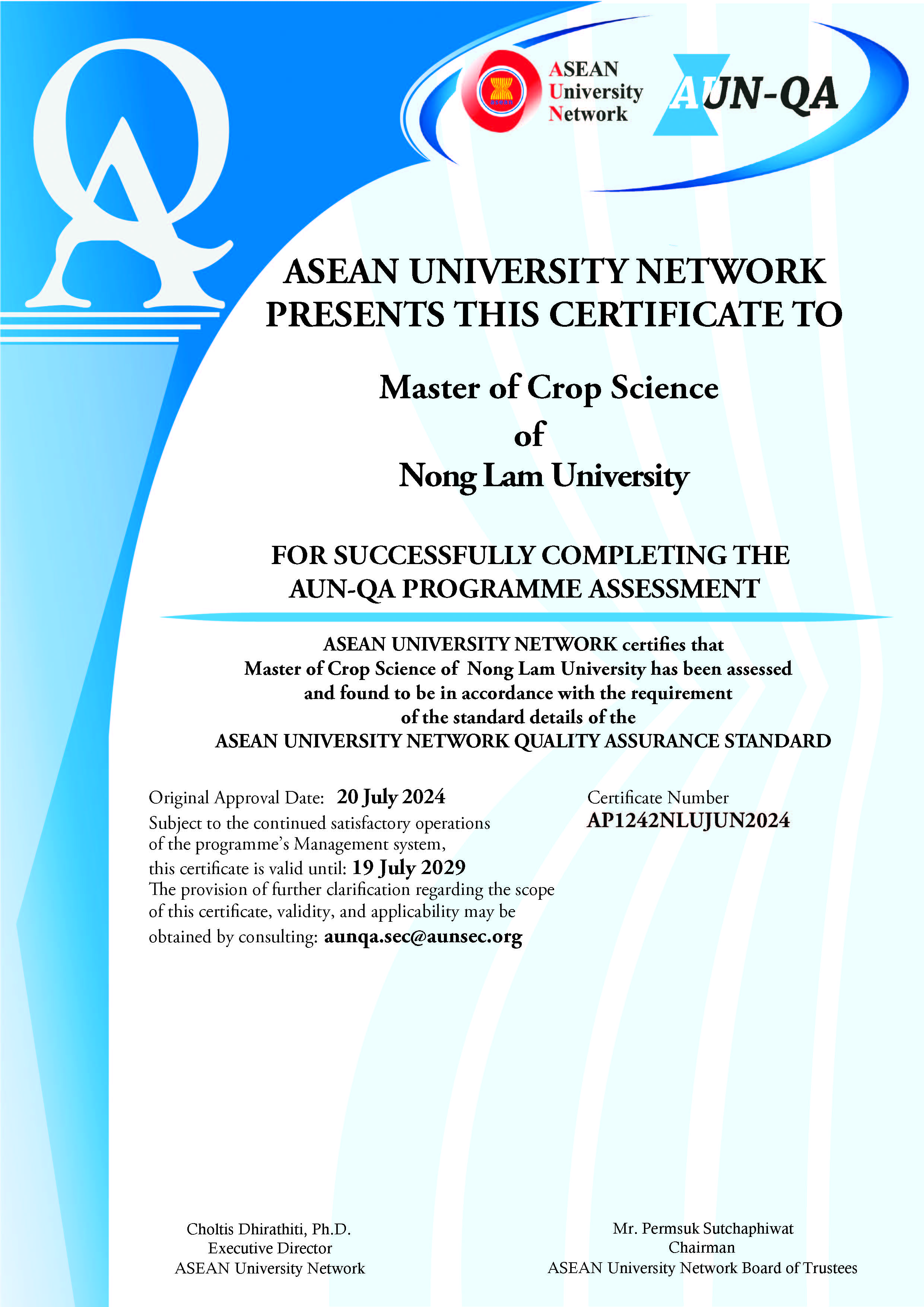BRIEF HISTORY OF FACULTY OF AGRONOMY AND BSA PROGRAMME
Brief overview of Faculty of Agronomy
Faculty of Agronomy (FA) is one among the first faculties right at the establishment of Nong Lam University - Ho Chi Minh City in 1955. The precursors of the faculty are respectively the Department of Agriculture at the College of Agriculture, Forestry and Animal Husbandry, the former name of NLU. In 1990, the Faculty was renamed into the Faculty of Agronomy. During the 64 years’ history, FA has been playing an important role in education, extension, dissemination of scientific technologies in Vietnam with its pursuit of academic excellence and commitment to country innovation and creativity.
The vision, mission, strategic objectives and educational philisophy of Faculty of Agronomy is as follows.
Vision to 2025
By the year 2025, the Faculty of Agronomy of NLU will be a leading unit in training, research and transfer of scientific advance in the field of crop production and plant protection in Vietnam, Southeast Asia and the world.
Mission
The FA of NLU provides high quality human resources and research findings for the area of crop production and plant protection in support of a safe and sustainable agriculture highly efficient and adaptable to climate change.
Strategic objectives
The FA of NLU is committed to providing quality education and training with creative and highly qualified graduates capable of serving the requirements of world of work; conducting researches, transfer of science and technology, and international cooperation in view of crop production systems that are safe, efficient, sustainable and adaptable to climate change; striving to catch up with renowned universities in the field of agronomy in Asia and the world.
Educational philosophy
The FA of NLU supports the education with "learner as the center" and "learning by doing" in an active and productive learning environment, developing learners’ self-directed learning, research capacity, and creativity. The Faculty philosophy of education is initiative learning and reality-based learning, in particular:
- The learners are initiative in their learning and research;
- The learners build up and reinforce their knowledge, skills and attitudes thanks to education and practical experiences;
- The learners are prepared for self-directed learning and lifelong learning.
Organizational structure
FA currently has 7 departments, namely Plant Physiology and Biochemistry, Genetics and Plant Breeding, Plant Protection, Soil-Agro Chemistry, Water Management, Food-Vegetable-Flower and Fruit Crops, and Industrial Crops; 10 practical laboratories, and Agronomy Research Station with total area of around 12 hectares for research, experiments, and practices. Organizational structure of FA is shown as follows diagram.

Currently, the Faculty has in total 39 staffs, among them 35 are lecturers including 3 Associated Professors (8.6%), 12 PhD graduates (34.3%), and 17 MSc graduates (48.6%), 1 MSc candidates (2.9%) and 2 BSc graduates (5.7%) who were trained locally or from foreign countries such as the USA, the United Kingdom, Germany, Australia, Russia, Belgium, the Netherlands, Hungary, South Korea, Japan, Israel, Malaysia, the Philippines and Thailand.
RESEARCH
Our on-going and productive research programs focus on improving of crop production and supporting the agricultural and environmental sustainability with the main areas as below:
- Selection and introduction of new plant varieties
- Water – soil resources management
- Cropping systems in the Mekong Delta, Southeastern areas and the highlands
- Agricultural chemical residues
- Heavy metals and Nitrate in agricultural products and environment
- Microorganism contamination in agricultural products
- Safe and organic vegetable production
- Irrigation and drainage systems
- Plant nutrition and soil fertility
- Pest management
COOPERATION
Domestic cooperation
The faculty has had strong cooperation with the Department of Science and Technology, and the Department of Agriculture and Rural Development in Hochiminh City and surrounding provinces: Ninh Thuan, Binh Thuan, Binh Phuoc, Ba Ria Vung Tau, Dong Nai, Lam Dong, Long An, Dong Thap, Ben Tre and Tra Vinh. The faculty also has active cooperation with the Southern Institute of Agriculture, the Southern Institute of Fruit Trees, and the Cuu Long Delta Rice Research Institute.
International Cooperation
The faculty has conducted many projects in related areas with organizations from various countries over the world. Some remarkable projects carried out by the faculty in recent years are (1) the Vietnam-Netherland Higher Education Project, (2) World Bank Project, (3) the Assessing the loss of rice yield in unirrigated fields (GTZ), (4) the Planning for Irrigation and Drainage systems in the Camau peninsula (IRRI), (5) Dry rice-seeding technique in unirrigated areas (IRRI), (6) Improving acid sulfate soils (IRRI), (7) Rice – Shrimp program (ACIAR), (8) Cassava Asian Regional Program (CIAT, SATREPS), (9) Rural development program (Switzerland), (10) Natural Resources Protection in highlands (Ford Foundation), (11) Cocoa Program (ACRI, USA), (12) Effects of agro-chemicals on soil microorganism communities (IRRI), (13) Soil and Plant contamination program (ACIAR), (14) Coconut Beetle program (FAO) and (15) Seed Conservation (Darwin Initiative and Reading University, UK).
EXTENTION
The faculty has disseminated research results as well as advanced technologies on new varieties, procedures for producing safe vegetables, procedures for intensive cultivation of various crops in the East and West Southern areas, highlands and the Central areas. Besides, the faculty has conducted short training courses for the local scientists and farmers.
Page count: 7543
Last modify: 26-08-2023




